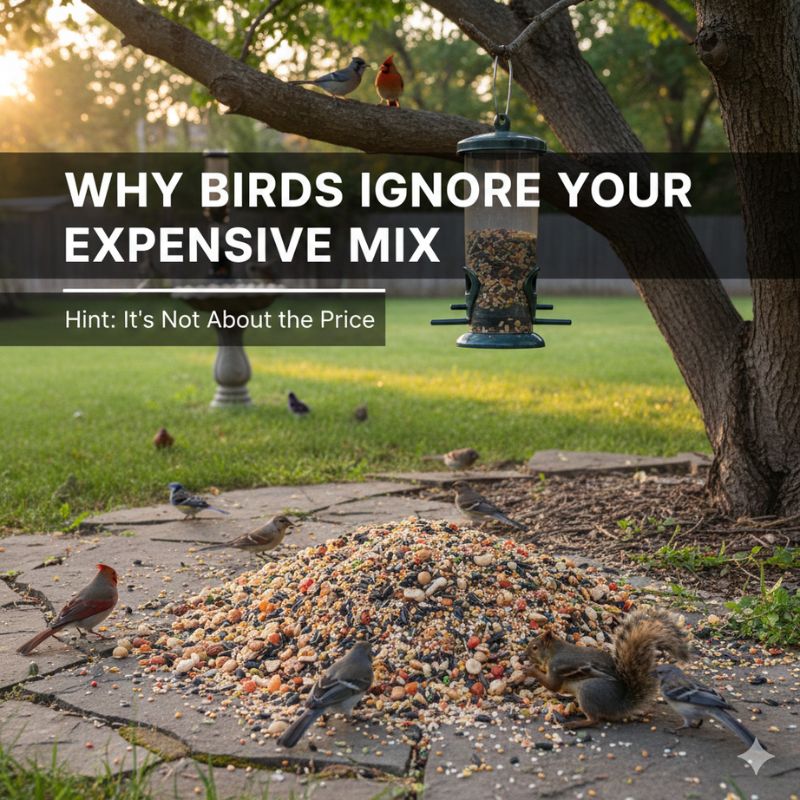Key Takeaways
Birds often ignore expensive seed mixes because they contain cheap filler seeds like red milo and golden millet, which are unappealing or difficult to eat. To ensure your bird food is eaten, look for mixes primarily containing the three preferred ingredients: Black Oil Sunflower Seed (BOSS), Hulled Sunflower Seeds (Chips/Hearts), and White Proso Millet. For small bird food, prioritize Nyjer seed and suet.
It’s a frustrating, all-too-common scenario: You invest in a premium, colorful, and seemingly perfect bag of bird food for sale, hoping to attract a vibrant flock. You pour the expensive mix into your feeder, step back, and wait. Days later, the feeder is still full, and the birds seem to be picking around the edges or ignoring it completely.
Why do birds snub your high-end selection, often preferring the cheap stuff next door? The truth is, your costly mix might be full of ingredients they don’t actually eat.
The Big Problem: Filler Seeds
Many pre-mixed bird food products, even those labeled “premium,” rely on filler seeds to bulk up the bag and keep costs down. These fillers are often seeds that birds find unappealing or difficult to crack. They look good to the human eye, but birds are picky eaters driven by efficiency and nutrition.
The three most common filler seeds birds ignore are:
- Oats and Cereal Grains: While nutritious for humans, they are not a preferred natural source of birds food.
- Red Milo (Sorghum): This large, reddish seed is a primary component of cheap mixes. It’s almost universally disliked by backyard birds in North America and often ends up scattered on the ground.
- Golden Millet: While white millet is adored by ground feeders, the golden variety is often left behind.
When birds pick through your expensive mix, they’re not being rude—they are efficiently tossing aside the fillers to get to the good stuff. The result is wasted food, a messy yard, and a full, ignored feeder.
What Birds Actually Want: The Top 3 Ingredients
If you want to ensure your bird food is a guaranteed hit, look for mixes composed primarily of these three ingredients. When checking any bird food, make sure these are listed first.
1. Black Oil Sunflower Seed (BOSS)
Often called the “black gold” of the bird feeding world. It has a high fat and protein content, and its thin shell makes it easy for almost all birds to crack. From cardinals and chickadees to titmice and woodpeckers, BOSS is the undisputed favorite.
2. Hulled Sunflower Seeds (Sunflower Chips/Hearts)
These are simply sunflower seeds with the shells removed. They are more expensive but are worth the cost because they are 100% edible, eliminating waste and mess beneath the feeder. This is especially fantastic for feeders meant for small bird food, as it reduces the effort needed for consumption.
3. White Proso Millet
This small, round seed is the top choice for ground-feeding birds like dark-eyed juncos, doves, and sparrows. If you see birds scratching around on the patio, try tossing a handful of white proso millet near the feeder.
Focus on the Right Size: Small Bird Food
If you’re specifically trying to attract chickadees, finches, and sparrows—the smaller species—your large-seed mix might be the problem. Many of these small bird food specialists struggle to handle large seeds like corn kernels or red milo.
To cater to them, look for:
- Nyjer Seed (Thistle): The absolute favorite of goldfinches and pine siskins. It must be served in a specialized mesh or tube feeder.
- Finch Mixes: Usually a blend of Nyjer and finely chopped sunflower hearts.
- Suet: A high-energy, rendered-fat cake that is perfect for woodpeckers, nuthatches, and chickadees, especially in cold weather.
By being mindful of what makes up your birds food—avoiding the cheap fillers and maximizing high-calorie, preferred seeds—you can ensure your expensive mix isn’t ignored, but is instead eagerly devoured by a busy, healthy flock.
Read More: Boost Immunity: The Top 7 Bird Treats Packed with Vitamins for a Longer, Happier Life
